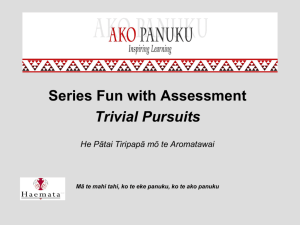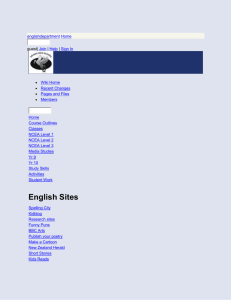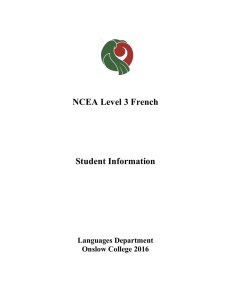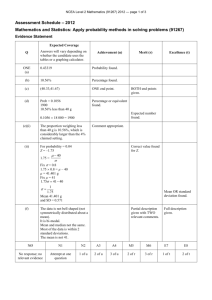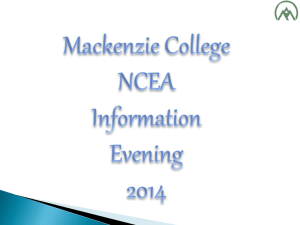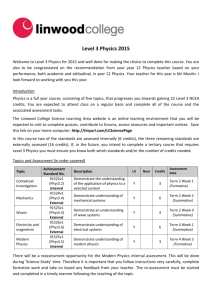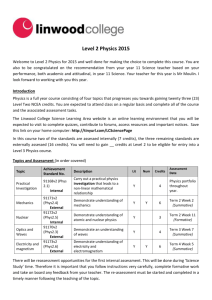2016 NCEA Information Booklet
advertisement
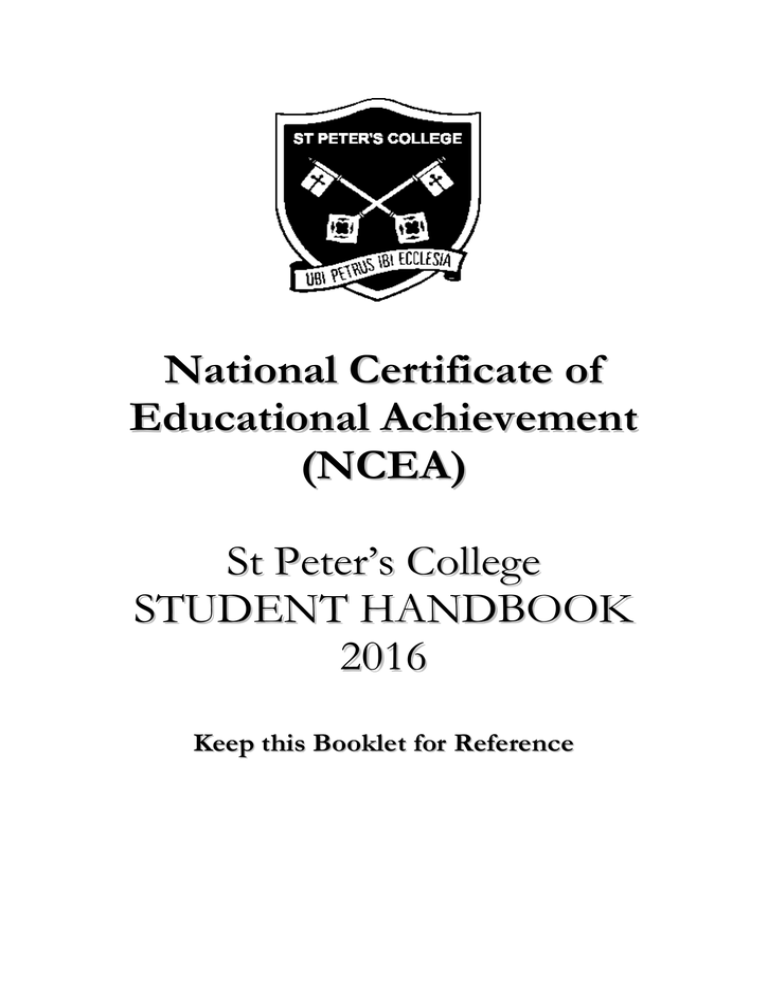
National Certificate of Educational Achievement (NCEA) St Peter’s College STUDENT HANDBOOK 2 016 Keep this Booklet for Reference CONTENTS Page 3: Page 4: Page 5: Page 6: Page 7: Page 8: Page 9: Page 10: Page 12: Page 13: Page 14: Page 15: Page 18: Page 20: Page 21: Introduction What is NCEA and How Does It Work? Endorsements Scholarship, Course Outlines and Authenticity University Entrance Reporting and Costs NCEA App Information Absences and Lateness Appeals Breaches of Rules and Authenticity Opportunities for Assessment and Reassessment Special Assessment Conditions, Derived Grades and Advice Tracking Sheet Copy of the Authenticity Statement 2016 Exam Timetable Student NQF Information Booklet 2016 Introduction NCEA is New Zealand's national secondary school qualification and provides students with pathways to tertiary education and workplace training. This year you will be gaining qualifications through standards at NCEA Level 1, 2 or 3 in all subjects. You may also work towards other National Certificates, such as those in Early Childhood. Your credits can be applied towards more than one qualification. This booklet contains guidelines that will help you to achieve success this year. During the year, your teachers will be collecting evidence that shows that you have achieved the standards so it is important that systems for assessment are consistent and fair. It is also important that you are aware of your rights and responsibilities for assessment. The guidelines in this booklet apply to all the internal assessments that provide evidence that you have reached the standards. They also apply to practice exams and to work that you complete for other external assessments like portfolios. It is essential that you – and your parents – understand how NCEA works. Please read this handbook, carefully and keep it handy to answer questions throughout the year. This information is also available on the school website. If you have any concerns about the information in this booklet, or NCEA or the NQF generally, do not hesitate to talk to me. All staff wish you the best for a very successful year’s study. Mrs J Lynch NQF/NCEA Co-ordinator 3 Student NQF Information Booklet 2016 WHAT IS NCEA? The National Certificate in Educational Achievement (NCEA) is the national qualification on the New Zealand Qualification Framework (NQF) for secondary school students. It is part of the National Qualifications Framework (NQF) which includes a range of other certificates and Qualifications such as National Certificates in: Early Childhood o Electronics Technology o Mathematics NCEA is administered by the NZ Qualifications Authority (NZQA) which runs the external exams and makes checks on schools to ensure that internal assessments are done fairly and consistently across all schools in New Zealand and includes moderation by National Moderators. HOW DOES NCEA WORK? NCEA L 1 L 2 credits Achievement Standards Gain at an Achieved, Merit or Excellence level L 3 Each year students study a number of courses or subjects. In each subject, skills and knowledge are assessed against a number of standards. For example, a Mathematics standard could be: Apply numeric reasoning in solving problems. Schools use a range of internal and external assessments to measure how well students meet these standards. When a student achieves a standard, they gain a number of credits. Students must achieve a certain number of credits to gain an NCEA certificate. There are three levels of NCEA certificate, depending on the difficulty of the standards achieved. In general, students work through levels 1 to 3 in years 11 to 13 at school. Students are recognized for high achievement at each level by gaining NCEA with Merit or NCEA with Excellence. High achievement in a course is also recognized. Each year your teachers will gather evidence that shows you have gained Achievement standards. Evidence about your achievement may be collected in a variety of ways, for example, group tasks, tests, projects and examinations. Some standards may be assessed during the year (internally assessed) and others through examinations held at the year (externally assessed) or by submissions of portfolios e.g. in Visual Art. Each Achievement Standard is worth a set number of credits. If you meet the set level you will receive all the credits for that Standard. You will have the opportunity to be recognized as achieving it at either a satisfactory (Achieved) level, a very good level (Merit), or at an outstanding level (Excellence). The grade does not affect how many credits you get however – if you pass at any level you will still receive all the available credits for that Achievement Standard. 4 Student NQF Information Booklet 2016 There are three levels of NCEA certificate. In general, you will work through levels 1 to 3 in Years 11 to 13 at school. Some students may study at a higher level in one or more subjects. Level 1 NCEA 80 credits minimum at Level 1 or higher including 10 in Literacy (reading and writing) and 10 in Numeracy. ( numeracy and literacy credits do not always have to come from Enlgish and Maths) Level 2 NCEA 60 at NCEA Level 2 or higher + 20 credits from any Level 1 + Level 1 Literacy and Numeracy requirements. Level 3 NCEA 60 credits at Level 3 or higher + 20 credits from Level 2 + Level 1 Numeracy and Literacy. ENDORSEMENTS You are recognised for high achievement at each level by gaining NCEA with Merit or NCEA with Excellence. High achievement in a course is also recognised. This is called Endorsement. When you perform consistently above the 'Achieved' level, your result(s) can be 'endorsed' to reflect that high achievement. This can occur either for the whole Certificate or at individual course level. Getting your certificate endorsed with Merit or Excellence is straight forward and says a lot about the quality of the work you do At Level 1, 2 or 3 you must achieve 50 credits or more at Merit or Excellence level If you have a combination of 50 or more Merit or Excellence credits you will receive your certificate endorsed with Merit. A combination of say 20 Excellence and 30 Merit credits will see your certificate endorsed with Merit. For some academic scholarships having your certificates endorsed with Excellence has become the minimum entry requirement for consideration. Courses can also be endorsed. You are required to gain 14 credits at Merit (or Excellence) in a calendar year. This usually includes at least three external credits - check with your subject teacher about whether your course qualifies. Fully internally assessed courses such as Religious Studies or Physical Education Studies are eligible for course endorsement. Getting a course endorsed shows that you have a real strength in that area of study and helps you to gain an overall course endorsement. The Record of Achievement shows endorsement awards. NZQA has a formal quality assurance process to ensure that the assessment of each standard is fair across all students, regardless of the school they attend. This includes internal moderation, external moderation and assessment system checks. 5 Student NQF Information Booklet 2016 SCHOLARSHIP Scholarship is a monetary award to recognise top secondary school students. Scholarship exams are externally assessed and are an additional set of exams. They enable you to be assessed against challenging standards, and are demanding for the most able students in each subject. They do not attract credits, nor contribute towards a qualification, but the fact that a student has gained a Scholarship appears on their Record of Learning. Entries are called for around mid-year and you should speak to you subject teachers and Mrs Lynch about possible entires. COURSE OUTLINES You will have access to a course outline for every NCEA subject you take. The course outline will include important information about your course, credits available, whether they are internal or external standards and other crucial information. AUTHENTICITY All work submitted must be your own. It is your responsibility to: Keep all drafts and working documents, and hand them into your teacher if required. Keep a record of all resources that are used including hand written plans and websites. Acknowledge the source of all material in your assignment, citing whether it is from text, electronic material or people. Ensure your data is accurate. Be prepared to discuss your work further with your teacher, if required. Sign the authenticity statement. You must not: Copy another student’s work. Quote material from written or electronic sources without acknowledging the source (plagiarism). Allow someone else to copy your work. Allow someone else to do your work. Use forbidden technology in a test or exam (e.g. non-designated printer, non-standard calculator, cell phone etc.) Where there is an authenticity of work issue, there will be an investigation of a Breach of the Rules. 6 Student NQF Information Booklet 2016 WHAT ABOUT UNIVERSITY ENTRANCE? University Entrance requires you to obtain Level 3. Including a minimum of 14 credits or higher in each of three subjects from the ‘approved’ subject list (see the Senior Subject Handbook for a list). Level One Numeracy (or better). University Entrance Literacy can be gained through English or Te Reo Maori. It should also be noted that many universities are now requiring much more than the above UE standard for guaranteed admission into particular courses, so you should check with the relevant institution early in the year for details. 7 Student NQF Information Booklet 2016 HOW IS NCEA REPORTED? Every student in New Zealand has a National Student Number (NSN). This is used as a personal identity number when you complete internal and external assessments for NCEA. It is also used to identify each student and allows schools, and other agencies, to register & track the progress of students. This allows NZQA to produce personalised exam packs - that is exam papers for the standards you are entered for. They will have your NSN on them. They can also be tracked through all stages of handling and marking. External examinations begin in November of each year. Once you have received your NSN number you will be able to register on the NZQA website to receive your results, look at your Record of Achievement (ROA) and also make a request for an official You may have one of these per year free of charge. Printed NCEA results are NOT sent to students automatically. You must log in and order one (free) by the 31st of December to receive it mid-January. A Record of Achievement (ROA) lists all standards and qualifications that a student has achieved. You can order one free copy of your SRS or ROA. Additional copies cost $15.30 (charge may be subject to change). COSTS The following are NCEA fees for NZ students in 2015 (note International fees are much higher – please speak to the International Director): One off cost all domestic students pay for NCEA (this includes external exams) Scholarship $76.70 $30.00 per extra subject Financial assistance is available for: Families having more than two students entering NCEA Community Service Card holders Those depending on a Work and Income or Study Link benefit as their main source of income Currently financial assistance reduces the fee to $20 per student, or $30 for all students in a studying for NCEA qualifications and who meet the community service or benefit criteria. School must collect the fees on behalf of NZQA so you will be asked to pay the fee later in the year – usually late July. 8 Student NQF Information Booklet 2016 SCHOOL PROCEDURES AND GUIDELINES Absences and Lateness Except for circumstances clearly beyond your control late work will not be assessed for NCEA purposes…. In exceptional circumstances an extension may be granted by the NCEA Co-ordinator... You need to apply on the ‘Request for an Extension’ form on the first appropriate day (with) supporting evidence… …if you are away on the day of assessment due to sickness your parent/ caregiver must ring and inform the office of this assessment and your absence before 9.00 am that day… Except for circumstances clearly beyond your control late work will not be assessed. You are expected to attend class regularly to ensure educational progress and to fulfil course requirements. It is important that appointments (e.g. orthodontist, doctor…) are not made during times when assessments are to be handed in, or when there is a test or practical assessment. In exceptional circumstances (e.g. severe illness, bereavement…) an extension to the due date for work may be granted by your teacher (in very clear cases) or the school NCEA Co-ordinator, Mrs Lynch. You will need to apply to your teacher using the ‘Request for Extension’ form on the first appropriate day after the work was due or before the date if the reason can be foreseen (get the form from Mrs Lynch). Time Management is important and too many assignments is not a reason for extension. In those cases talk directly to your teacher well before (weeks if possible) to see if an alternate timeframe can be arranged. If you are away on the day of an assessment due to sickness your parent/caregiver must ring and inform the office of this assessment and your absence before 9.00 am that day. The person in the office will then notify the teacher. Often you will need supporting evidence from an independent source (such as a Medical Certificate). You will be informed of the decision of your application for an extension in writing. Teachers have a responsibility to give fair and reasonable time to complete assessment work, and to let you know relevant assessment dates well in advance. “My parents are taking me to Australia with them during the holidays, but they want to leave three days before the school term ends because air tickets are cheaper. What should I do?” Talk to each of your teachers to see if there are any tests or assessments that will be due during the time you will be in Australia. If any assessments are due, they will need to be handed in before you go. Late work will receive no credit. “If I hand my assignment in late, how many marks do I get penalised?” If you do not have a legitimate reason (e.g. illness) you will not gain any credit for the assessment. Marks (or grades) will not be deducted – either the work is accepted and you get what you deserve, or it is rejected and you receive no credit. “What happens if I ‘wag’ a test because I needed more time to study?” You will get no credit for the assessment and you will not be given a chance to re-sit the test. (It is the same penalty if you ‘wag’ school to finish an assignment – if it is late then no credit.) “I have got really ‘bogged down’ with work because I travelled to a family funeral in Hamilton, and I can’t make a good job of my research assignment and finish it on time. What should I do?" You must apply for an extension several days before the assessment is due – to the NCEA Co-ordinator, Mrs Lynch, she will give you a form to complete. It must be signed by a parent/caregiver, and evidence provided and then you give that to your teacher to work through finding an appropriate time frame. 9 Student NQF Information Booklet 2016 “My assessment is due to be handed in today, but I am really sick and can’t make it to school. What should I do?” 1. Get a parent/caregiver to ring the school to inform us that you are absent on that day. 2. It if is possible, get a friend or family member to hand in your assignment to your classroom teacher. If this can’t be arranged, hand your assignment in the same day you get back to school, along with a note from your parent/caregiver and a doctor’s certificate. “What do I do if I have a test/field trip/speech/dramatic monologue … to do, but I am too unwell to attend school?” 1. Get a parent/caregiver to ring the school to inform us that you are absent. 2. On your first day back to school, bring a note signed by your parent/caregiver with a medical certificate 3. Your teacher will let you know if and when you are able to redo the assessment. In some cases it may not be appropriate to redo the assessment – this is especially true if it was a field trip or practical assessment.. “What do I do if I have an inter-school sports trip on the day an assessment is due?” You must hand in your work before the trip. However, where possible, assessment dates will be set so as not to coincide with large school-based activities. “What do I do if I had to work late in the days before the assignment is due?” This will not be a reason for an extension. Either it is handed in on the due date or you miss out. “I had three assignments due in the same week – surely I can get an extension for one of them?” Sorry, but no extension will be granted. Teachers will try and set dates to minimise overlap, but depending on what subjects you do this is not always possible. Talk to your teacher/Mrs Lynch or your C2S coach. “I am going to be away for school exams but this doesn’t matter does it as they don’t count for credits?” School exams are vital preparation for success at the end of the year so they are extremely important form a learning perspective. Also, if you need to make a request for a derived grade at the end of the year, teachers may have to forward to NZQA evidence of the external assessments you sat. If you did not show you can meet the standard you will not get a derived grade. Appeals You have the right to lodge an appeal if you believe that you have been unfairly disadvantaged in the assessing or recording of work completed for the NQF… You have the right to lodge an appeal if you believe that you have been unfairly disadvantaged in the assessing or recording of work completed for NCEA qualifications. Grounds for appeal include: a mistake made by the marker alleged misconduct unfairness in the way marks were awarded incorrect recording or transfer of results to NZQA failure to be given a reassessment opportunity where it is practical The main principle that will The main principle that will be considered is fairness. be considered is fairness… If you believe that you have grounds for appeal you must approach the teacher within 3 days of receiving the assessment back (or the incident occuring) and attempt to sort it out then. 10 Student NQF Information Booklet 2016 If you are still dissatisfied, then you must approach the HOD of the subject area (or if the HOD is your teacher, another teacher the HOD nominates) with your concern. This second teacher will reassess the work in question and let you know. If you still believe that you have been wrongly assessed you may appeal in writing to the NCEA Coordinator, Mrs Lynch, on the ‘Assessment Appeals Application’ form. The NCEA Co-ordinator will investigate fully and let you know her decision in writing. The NCEA Co-ordinator’s decision is final. My work is heaps better than my friend but she got a higher mark than me. Can I appeal?” Disagreement with a mark is not enough to base an appeal. You must have clear grounds to indicate that you have been unfairly disadvantaged over other students. Breaches of Rules and Authenticity Authenticity means that all work submitted must be your own. Not doing so is considered cheating. It is your responsibility to: Keep all drafts and working documents, and hand them into your teacher if required. Make a copy and save as you go! Keep a record of all resources that are used including hand written plans and websites. Acknowledge the source of all material in your assignment, citing whether it is from text, electronic material or people. Ensure your data is accurate. Be prepared to discuss your work further with your teacher, if required. Sign the authenicity statement. You must not: Copy another student’s work Quote material from written or electronic sources without acknowledging the source (plagiarism). Allow someone else to copy your work. Allow someone else to do your work. Use forbidden technology in a test or exam (e.g. nondesignated printer, non-standard calculator, cell phone etc.) Where authenicity of work is an issue there will be an investigation of a Breach of the Rules. Breaches of Rules include: plagiarism, impersonation, flase declaration of authenticity, using notes in an assessment or exam, collusion (communicating with others, disruption or dishonesty assisting or hindering others during an assessment or exam) or dishonesty (lying about reasons for submitting late work, or altering answers prior to seeking an appeal and authenicity issues). 11 Student NQF Information Booklet 2016 Cheating is considered an extremely serious offence… This is about guaranteeing that the work you present for NCEA assessment is your own. You are required to sign the authenticity statement each year. For many assessments it is appropriate to learn at home and gain information from a variety of sources. This must be suitably acknowledged. However, you must NEVER claim that work necessary for assessment is your own when this is untrue. It is vital that you are very clear how much outside help you are allowed for any assessment work. CHECK WITH YOUR TEACHER FIRST. Teachers will use a number of different practices to reassure themselves that the work you submit is legitimate. The penalties for cheating – Cases of suspected cheating will be thoroughly investigated. If the or helping someone else cheating is confirmed you may suffer some or all of the following: cheat – are very severe… no grade being awarded no opportunity for reassessment be brought before the Board of Trustees Disciplinary Committee and subject to any of the sanctions they have at their disposal being barred by NZQA from entering other qualifications if the breach occurs in external exams Similarly, if you help another student cheat, such as by deliberately allowing them to copy work you produced, this will result in the same procedures being applied to you. In other words, the case will be considered as if you had cheated yourself. “I gave my assignment to Jane to look at and she copied it. Our teachers have found out because they mark work together. Do I still gain credit for my assignment?” NO!!! Both Jane and you will receive, at least, no credit for your assignments and you will not be given an additional reassessment opportunity (you have both been dishonest). It is not a good idea to give someone else your work before it is assessed. “Janine’s research assignment is great because her older sister helped her with it. I copied parts that I thought were really good to help me gain a higher grade. Am I in trouble?” Yes!! Work submitted for assessment must be your own work and your teachers need to be able to verify this. Both you and Janine would not gain credit for your assessments, because the work is not entirely your own. Opportunities for Assessment Unless there is good reason not to, all students will be given another opportunity to gain credit for each Achievement Standard. A Reassessment is where a new assessment task is provided after your first opportunity, and after additional teaching and learning has taken place. For some tasks this may not be reasonable or practicable. Time does not always allow for this to happen on a scheduled class basis but you may ask your teacher for a reassessment opportunity. A Resubmission may be offered for an assessment where a teacher judges that a mistake has been made by you, and which you are capable of discovering and correcting by yourself. 12 Student NQF Information Booklet 2016 “The first time I did this Achievement Standard I got a Merit grade. The second one time I did it I only got Achieved. Which grade counts?” It is the best grade that will count. Special Assessment Conditions Special assistance may be available. We are all here to help! If you have a permanent or long-term condition or learning difficulties, which you believe will significantly impair your performance in specified internal or external assessments - in particular written examinations – you may apply for special assessment considerations. Contact the HOD Learning Support for assessment of your eligibility and speak to Mrs Lynch for further information. As a result of a Special Assessment Condition (SAC) being applied for and subject to approval, you may be provided with valid and fair assessment conditions for both internal and external standards. Derived Grade If you cannot sit your external examination due to a serious situation e.g. illness - you must see Mrs Lynch immediately and collect a form. This will need to be completed by a doctor or other appropriate person. St Peter’s College must provide a grade based on pre-existing standard specific evidence for each standard a Derived Grade is being sought. The school recommends a derived grade based on your performance in school examinations and other practice assessments so you need to take these seriously. GOOD ADVICE ABOUT NCEA Getting enough credits for my Level One (or Two or Three) Certificate is just a first step… Initially you will be focussed on getting enough credits for your NCEA certficiate: However, you must not stop there, because: for future study or employment it is in your best effort to show what you are able to do. To do this you need to show, through assessment that you can do more. you may not be able to get into courses you want at higher levels in the school if you haven’t got the right number of credits in that subject. Some subjects also require you to gain particular standards before you can advance to a higher level. The grade of pass in an Achievement Standard is more important than the number of credits it offers… Some people make the mistake that it doesn’t matter what grade you get – as long as you pass a standard that is all that matters. They think this because if you pass a standard you get the same number of credits regardless of what grade (Achieved, Merit or Excellence) you get. This is a big mistake. Although it won’t affect the number of credits you get, a Merit or Excellence pass in an Achievement Standard is better than an Achieved because: 13 Student NQF Information Booklet 2016 it shows an employer that you know the material better than someone who just got an Achieved some courses at Level 2 or 3 require some Merit passes before you are allowed to do them it is more challenging to get a higher grade and therefore more rewarding when you do succeed Some tertiary courses require higher grades – check with the Careers Department. Getting your certificate endorsed with Merit or Excellence Getting your certificate endorsed with Merit or Excellence is straightforward and says a lot about the quality of the work you do. At Level 1, 2 or 3 you must achieve 50 credits or more at Merit or Excellence level. If you have a combination of 50 or more Merit and Excellence credits you will receive your certificate endorsed with Merit. For some academic scholarships, having your certificates endorsed with Excellence has become the minimum entry requirement for consideration. Keep good records of your assessment and check regularly… There are huge administration demands on running assessment programmes and sometimes mistakes happen. It is very important that you keep track of: standards offered in each course what standards assessment activities relate to and when they are coming up Ways you can keep track of these include: making use of the tracking sheet in this booklet checking your results through the school portal regularly referring to the course booklets some other system that suits you It is also important to check that results are recorded accurately by the school. All results are entered onto the computer at school and these are sent to NZQA. Therefore, if you think the results on the portal do not show accurately everything you have done it is vital you see your subject teacher about it and quickly sort it out. If there are any problems that you can not resolve, see Mrs Lynch. You will also be able to check online at the NZQA website. The website has very good systems and will help you track your course and overall certificate endorsement and course endorsements. If you have concerns about NCEA you may talk to your subject teachers, C2S learning Coach, a Dean or the NCEA Coordinator, Mrs Lynch. We are all concerned that you are given the best opportunity to show whether you can meet the standards required of this qualification in a way that is fair to all. 14 Student NQF Information Booklet 2016 Other things to note: English and Literacy Credits are not the same thing. 10 Literacy Credits are required as part of NCEA Level 1. These may come from a range of subjects such as History and Religious Studies. English credits are generally literacy credits, but English is a subject and you MUST gain sufficient English credits at Level 1 to move on to Level 2 English. If you do not, you will have to repeat Level 1 English in Year 12. NCEA certificates may be gained over more than one year. e.g if you only gained 70 credits as a Year 11 student, your Year 12 assessments (at Level 1 or 2) will count towards completing your Level 1 certificate. If they are Level 2 credits they will also count towards your Level 2 certificate. It is the same for higher levels. The NCEA fee is a flat fee for all standards paid yearly. Whether or not you are sitting external examinations you still have to pay the NCEA fee. It is for your qualification and you must be “hooked on” each year you are in Senior School. 15 Student NQF Information Booklet 2016 NCEA CREDIT TRACKING SHEET 2016 C o u r s e AS number D a t e Brief title 16 Int./ Ext. L e v e l C r e d i t s G r a d e Student NQF Information Booklet 2016 17 Student NQF Information Booklet 2016 NCEA Authenticity Statement 2016 I, _____________________________________, state that all work I submit for assessment this year will be my own work, completed without the unauthorised help of others. I will not allow other students to copy my assessment work. I will not allow somone else to do my work. I will not quote material from written or electronic sources without acknowledging the source (plagiarism) clearly. I will not use use forbidden technology in a test or exam ( e.g. non-designated printer, non-standard calculator, cell phone etc.) I understand that if I hand in work that is not my own, I will receive no credit. Signature: _____________________________________________________ Please complete and hand to your C2S Learning Coach 18
